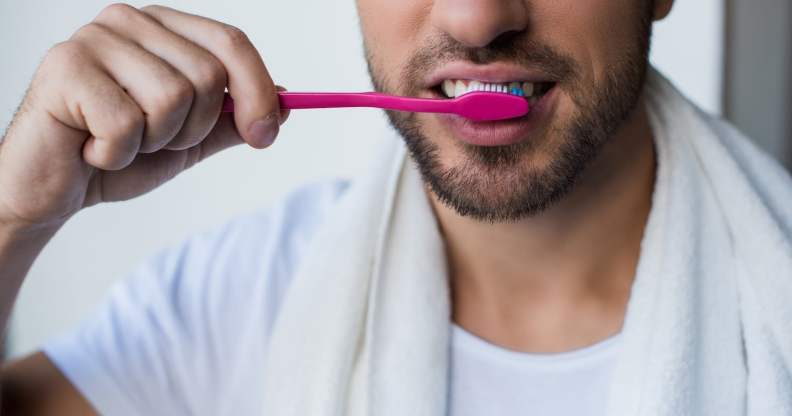It’s the year 2020 and doctors are falsely claiming HIV can be transmitted by sharing toothbrushes. Yes, really

Dr Nigel Carter of the Oral Health Foundation has come under fire from HIV Scotland for claiming that HIV can be transmitted by sharing toothbrushes (Envato Elements)
A doctor has been heavily criticised by HIV charities for claiming that the virus can be transmitted by sharing toothbrushes.
Dr Nigel Carter, chief executive of the Oral Health Foundation, claimed that HIV can be passed on by using the same toothbrush as a person who has the virus, despite the fact that it cannot be passed on through saliva.
Carter’s claims were published in articles on the Oral Health Foundation’s website as well as on Dentistry.co.uk, after a new study suggested people who contract COVID-19 could pass the virus on to other members of their household by sharing toothbrushes.
Responding to that study, Carter said: “There are many hundreds of different bacteria and viruses in our mouths and those sharing a toothbrush could be passing these on to others.
“While this might be something relatively harmless, such as a common cold or cold sore, if the person you are sharing with is infected with hepatitis B, HIV and now coronavirus, these could also be passed on via the toothbrush, with severe health consequences.”
Carter’s comments were condemned by Nathan Sparling, chief executive of HIV Scotland, who said the claim was untrue and would contribute to stigma and misinformation.
“It is quite shocking to see a senior figure being quoted as saying HIV is passed on from sharing toothbrushes,” Sparling said.
“This is rooted in stigma and misinformation going back almost 40 years. I can’t believe that in 2020 I have to issue a statement to clarify that HIV is not transmitted through toothbrushes.”
Sparling continued: “While sharing a toothbrush might pose other infection risks – such as COVID-19 – we must challenge the myths and misinformation about HIV.”
Even in blood, HIV is a very fragile virus which does not survive for long at all once outside the body. Therefore, any risk associated with, for example, bleeding gums, is entirely negligible.
Sparling said he has spoken with Tom Ferris, Scotland’s chief dental officer, to discuss how they can issue a “clear and unequivocal statement to dentists in Scotland” clarifying that HIV is not transmitted by sharing toothbrushes.
This is not the first time the Oral Health Foundation has claimed HIV can be transmitted by sharing toothbrushes. In 2019, the charity released the exact same comment as the one attributed to Carter on Tuesday.
The comment, released in June 2019, also claimed that HIV can be transmitted by sharing toothbrushes after a study found that a quarter of Brits share their toothbrushes with other people.
While both quotes are identical, Tuesday’s version was attributed to Carter while the 2019 version was credited to Dr Ben Atkins, dentist and trustee of the Oral Health Foundation.
Dr Nigel Carter was criticised by HIV Scotland for claiming that the virus can be passed on through shared toothbrushes.
When approached for comment, Carter defended his claims, telling PinkNews that HIV transmission through toothbrushes is “extremely rare” but it is possible. He said there had been “only a couple of documented cases” since the HIV epidemic began in the 1980s.
“The Oral Health Foundation is not putting this forward as a primary means of transmission for HIV,” Carter added. “Sharing toothbrushes remains more common for transmission of hepatitis B and C, along with other viral infections,” Carter said.
“It is important that all health charities and bodies share consistent messages and we welcome a joint approach with HIV Scotland to give clear and sensible advice about oral health and HIV in the future.”
However, Nathan Sparling of HIV Scotland refuted Carter’s comments, telling PinkNews that HIV cannot be transmitted through sharing toothbrushes.
“HIV cannot be transmitted by saliva,” Sparling said.
“Even in blood, HIV is a very fragile virus which does not survive for long at all once outside the body. Therefore, any risk associated with, for example, bleeding gums, is entirely negligible.”
He continued: “To our knowledge, the only cases where HIV transmission has been potentially attributed to a toothbrush are from the early 90s and involved people who were not on treatment and were at late stage HIV infection. The cases in which these are mentioned conclude other transmission routes for the cause of infection.
“There has not been any documented cases since and the context now is very different with effective treatments meaning most people living with HIV live long, healthy lives, where they do not progress to this stage and cannot pass the virus on.”
This was reiterated by both the National AIDS Trust and the Terrence Higgins Trust, which both told PinkNews that HIV cannot be passed on through toothbrushes.
“We echo HIV Scotland in that sharing a toothbrush is not a route of HIV transmission,” Kat Smithson, director of policy at the National AIDS Trust said.
“It is important not to perpetuate myths around HIV transmission, especially as misconceptions are common in society including, as shown here, the dental profession. These misconceptions add to the stigma and discrimination that people living with HIV often experience.”
Meanwhile, Ian Green, chief executive at the Terrence Higgins Trust, said: “HIV cannot be passed on by sharing a toothbrush. HIV is passed on through blood, semen, vaginal fluid, anal mucus and breast milk – but only if the person with HIV has a detectable viral load.
“Stigma remains one of the biggest challenges in the response to HIV. Incorrectly implying that HIV can be transmitted by sharing toothbrushes only serves to deepen this stigma. Charities and healthcare professionals must stop using outdated or incorrect information that perpetuates stigma around HIV.”

